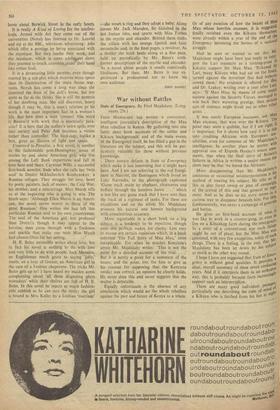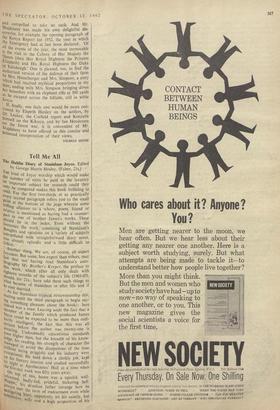War without Battles
FRED M AJDALANY has written a convenient, intelligent journalist's description of the Mau Mau rebellion in Kenya. By gathering into one fairly short book accounts of the settler and Kikuyu backgrounds, and of the main events of the Emergency itself, he has filled a gap in the literature on the subject, and this will be par- ticularly valuable for those without previous knowledge.
There remain defects in State of Emergency which make it less interesting that it might have been. And I am not referring to the red frangi- pane in Nairobi, the flamingoes which breed on Lake Naivasha, or the photograph captioned `Game track made by elephant, rhinoceros and buffalo through the bamboo forest . . .' which is less like any game track that I have seen than the track of a regiment of tanks. For these are exceptions and on the whole Mr. Majdalany presents his natural and human background with conscientious accuracy.
More regrettable in a short book on a big subject is a tendency to be repetitive, though even this perhaps makes for clarity. Less easy to excuse are certain omissions which, in a book subtitled 'The Full Story of Mau Mau,' seem inexplicable. For when he reaches Kenyatta's arrest Mr. Majdalany writes: 'This is not the point for a detailed account of the trial. . . But it is surely a point for a summary of the issues; and the point, too, for him to give us his reasons for supposing that the Kenyatta verdict was correct, an opinion he clearly holds. He never does this and never suggests that the matter is debatable.
Equally unfortunate is the absence of any conclusion which would set the whole rebellion against the past and future of Kenya as a whole.
Or of any mention of how the beasts of Man Mau whose horrible excesses, it is suggested, finally revolted even the Kikuyu themselves, were already within a year of the end of the Emergency becoming the heroes of a national struggle. Had he seen or wanted to see this Mr. Majdalany might have been less ready to inter' pret the Lari massacre as a turning-point rn Kikuyu support for Mau Mau. 'Sickened by Lari, many Kikuyu who had sat on the fence, turned against the terrorism that had hitherto cowed them.' No evidence is offered for this, and Dr. Leakey, writing over a year after Lari, says: `If Mau Mao, by means of some major success against the Security Forces. managed 10 win back their wavering prestige, then serious acts of violence might break out in other tribal
areas. . '
It was surely European successes, not Mau Mau excesses, that won over the Kikuyu. The point may seem a quibble, but if I am right, it is important, for it shows how easy it is to shP into crediting Africans with European sen- sibilities, even for someone of Mr. MajdalanY's intelligence. In another place he quotes vvith approval one of Elspeth Huxley's wisest con: ments, that when the final story of Britain s failures in Africa is written a major reason for them may be that 'we bored the Africans.' More disappointing than Mr. MajdalanY:s omissions or occasional misinterpretations is his, method of treating his subject. He tells us 01 this or that forest sweep or plan of camPaign.' of the arrival of this and that general or reg- ment. And as he does so his story seems /11_3 curious way to disappear beneath him. For this, fundamentally, was never a campaign of generals and battles. He gives no first-hand account of what it was like to work in a counter-gang, or even to live on a Kinankop farm during the emergency In a story of a conventional war such things ,. might be out of place, but the Mau Mau war consisted, with very few exceptions, solely of things. There is a feeling, in the end, that Pa', Majdalany has been let down by his subject as much as the other way round. Finer- ! hope I have not suggested that Sate of gency is without good qualities. It provides clear, overall summary of these seven confusill! years. And if it interprets them in an orthodox way, this is probably because facts increasingly support such an interpretation. There are many good individual passages particularly one describing the state of mind a Kikuyu who is fetched from his but at nigh and compelled to take an oath. And Mr. Majdalany has made his own delightful dis- coveries, for example the opening paragraph of the Kenya Report for 1952, the year in which the Emergency had at last been declared : `Of all the events of the year, the most memorable is the visit to the Colony of Her Majesty the Queen (then Her Royal Highness the Princess Elizabeth) and His Royal Highness the Duke of Edinburgh.' One is pleased, too, to find the authorised version of the defence of their farm by Mrs. Hcsselberger and Mrs. Simpson, a story which had reached mythical proportions in my time ending with Mrs. Simpson bringing down her houseboy with an elephant rifle at 300 yards as he escaped across the hillside, still in white If, finally, one feels one would be more con- v_inced by Elspeth Huxley on the settlers, by Dr Leakey, the Corfield report and Kenyatta tumself on the Kikuyu, and by Ian Henderson Z1 the forest war, it is convenient of Mr. Majdalany to have offered us this concise and balanced interpretation of their views.
THOMAS HINDE







































 Previous page
Previous page